|
|
|
Sort Order |
|
|
|
Items / Page
|
|
|
|
|
|
|
| Srl | Item |
| 1 |
ID:
080702
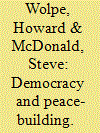

|
|
|
|
|
| Publication |
2008.
|
| Summary/Abstract |
This article, which is a systematic analysis of the practical experiences of the authors in facilitating workshops to help resolve African conflicts, argues that we need to think again about how we both conceptualize and operationalize peace-building techniques. As the Iraq debacle may be said to show, to impose a peace settlement and democratic government institutions on a state and people after a war does not, by itself, work. What is needed is a much deeper understanding by the parties to the conflict that they have shared interests, a common vision and must learn to work in collaboration with one another. In their work in Burundi, the Democratic Republic of Congo and Liberia, the authors and their team have developed new training techniques that are based on experiential learning. They organize workshops that bring key leaders together in a long-term process designed to resolve the tensions and mistrust that are the inevitable by-product of conflict and war, and to build (or rebuild) their capacity to work effectively together across all of the country's lines of ethnic and political division. Through the teaching of concepts such as 'interest-based negotiation' they aim to develop better real communication between the parties and to enhance collaborative capacity that will help build really solid personal and institutional relationships and lasting peace.
|
|
|
|
|
|
|
|
|
|
|
|
|
|
|
|
| 2 |
ID:
080700
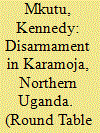

|
|
|
|
|
| Publication |
2008.
|
| Summary/Abstract |
Disarmament is a major feature of international, regional and national small arms and light weapons control policy and legislation worldwide. The proliferation of arms is now a significant problem amongst pastoralists in the Horn of Africa. In Karamoja, northern Uganda, where armed inter-communal and intra-communal conflict is disrupting lives and livelihoods, several attempts at mitigation have been tried. This article considers whether disarmament attempts have provided any solution to the conflicts. Empirical data collected between 2000 and 2006, consisting of interviews with combatants, local leaders and community members, government reports and media articles have been used to recount these endeavours and their consequences in the communities. The work first gives the regional and cross-border arms dynamics. It then considers the history of conflict and disarmament in Karamoja and examines in detail the recent disarmament since 2001. The successes or failures are considered in terms of weapons collected, mitigation of conflict and establishment of valuable processes such as community participation or inter-agency cooperation
|
|
|
|
|
|
|
|
|
|
|
|
|
|
|
|
| 3 |
ID:
080697
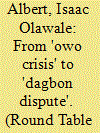

|
|
|
|
|
| Publication |
2008.
|
| Summary/Abstract |
The politicization and manipulation of traditional chieftaincy which begun under colonial rule was increased by military and civilian regimes in independent Ghana and Nigeria. The intrusion of national politics resulted in an escalation of chieftaincy disputes leading to loss of life and destruction of property. This process is illustrated by the Owo crisis in Ondo State Nigeria and the Dagbon kingdom dispute in Northern Ghana.
|
|
|
|
|
|
|
|
|
|
|
|
|
|
|
|
| 4 |
ID:
080701
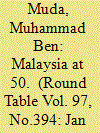

|
|
|
|
|
| Publication |
2008.
|
| Summary/Abstract |
The Commonwealth has had a central place in Malaya's foreign policy, especially in the period immediately after independence. This was, in part, due to its then current requirement for assistance with its external defence. In addition, there were no regional organizations in Southeast Asia whose purpose and objectives were centrally relevant to Malaysia's experience and national goals. The later emergence of ASEAN, OIC, or other similar bodies, has led to some erosion of Malaysia's profound attachment to the Commonwealth. This is not to suggest that Malaysia has entirely abandoned its support for the Commonwealth's existence. Generally, nowadays it prefers to play a quiet and supporting role in the organization. But Malaysia's leaders believe that the Commonwealth still has a role to play in helping to promote Malaysia's foreign and economic policy objectives, even though it may be relegated to a fourth place in the list of international instrumentalities
|
|
|
|
|
|
|
|
|
|
|
|
|
|
|
|
| 5 |
ID:
080699
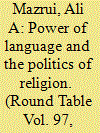

|
|
|
|
|
| Publication |
2008.
|
| Summary/Abstract |
English, the lingua franca of the Commonwealth, is also the World's most influential language in human history. The influence of English as the language of academe may be reflected in the fact that more books about all the religions of the world have probably been published in English than in any other language on earth. This is perhaps because the former British Empire has always had to deal with a multiplicity of religions within its dominions. Today, the Commonwealth of Nations comprises more than a third of the Muslim population of the world-lodged in Pakistan, Bangladesh, India, Nigeria, and elsewhere.2 The Commonwealth also includes about a third of the Christian countries of the world-in Africa, the Caribbean, Britain, Canada, Australia, and New Zealand, and the Anglophone world of the Pacific. This article addresses such paradoxes as to why Muslims are well represented in the Commonwealth while Arabs are not, and why Christianity is under siege globally while the English language is the dominant international language
|
|
|
|
|
|
|
|
|
|
|
|
|
|
|
|
| 6 |
ID:
080698
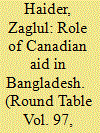

|
|
|
|
|
| Publication |
2008.
|
| Summary/Abstract |
The central argument of this paper is that Canada has played an instrumental role in the development process of Bangladesh since independence in 1971. Even though Canadian aid is not as political as that of other donors, it originated from Canadian national interest, in order to gain influence over Bangladesh and access to its market for Canadian products. Apart from this, although Canadian aid is directed towards poverty reduction, in Bangladesh it has not made any significant breakthroughs in this regard.
|
|
|
|
|
|
|
|
|
|
|
|
|
|
|
|
|
|
|
|
|